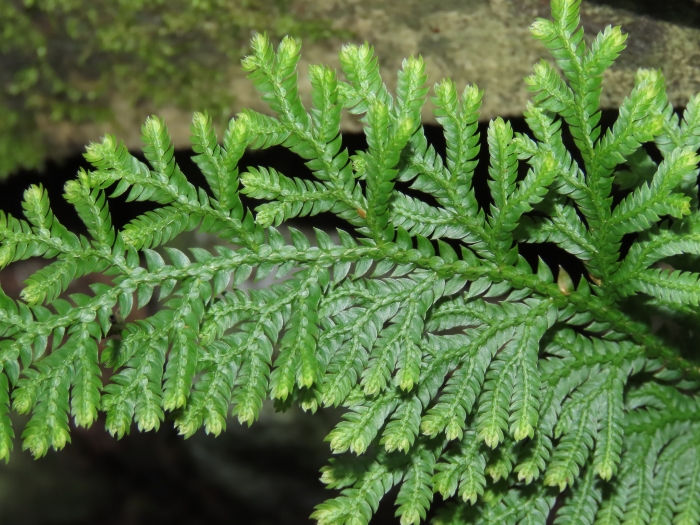Spikemoss
(Selaginella moellendorffii)
Spikemoss (Selaginella moellendorffii)
/
/

chiuluan
CC BY 4.0
Image By:
chiuluan
Recorded By:
Copyright:
CC BY 4.0
Copyright Notice:
Photo by: chiuluan | License Type: CC BY 4.0 | License URL: http://creativecommons.org/licenses/by/4.0/ | Rights Holder: chiuluan | Publisher: iNaturalist | Date Created: 2024-02-14T13:47:09-08:00 |

























Estimated Native Range
Summary
Selaginella moellendorffii, commonly known as Spikemoss, is a perennial herbaceous lycophyte native to Southeast and East Asia, including regions of China, Taiwan, and the Philippines. It is found in shaded, humid forest floors and rock crevices, often forming dense mats. This species is characterized by its small scale-like leaves, which are arranged spirally around the stem, giving it a moss-like appearance. It exhibits dichotomous branching and produces cones with spores, reflecting its ancient lineage and non-flowering plant status. Spikemoss typically grows to a height of 2-8 inches (5-20 cm) and spreads indefinitely in width, creating a lush carpet of greenery.
Spikemoss is valued for its unique texture and is often used in terrariums, as ground cover in shaded gardens, or in rock gardens where moisture is adequate. It thrives in part to full shade, prefers consistently moist, well-drained soil, and is relatively low maintenance once established. Its ability to tolerate low light conditions makes it an excellent choice for indoor cultivation as well. While it is not prone to many diseases, overwatering can lead to root rot. It is also important to note that Selaginella moellendorffii is not a true moss, but rather a vascular plant with a more complex structure, including roots, stems, and leaves. Its small genome size and status as a model organism in comparative genomics provide valuable insights into plant evolution, especially concerning the transition from gametophyte- to sporophyte-dominated life cycles.CC BY-SA 4.0
Spikemoss is valued for its unique texture and is often used in terrariums, as ground cover in shaded gardens, or in rock gardens where moisture is adequate. It thrives in part to full shade, prefers consistently moist, well-drained soil, and is relatively low maintenance once established. Its ability to tolerate low light conditions makes it an excellent choice for indoor cultivation as well. While it is not prone to many diseases, overwatering can lead to root rot. It is also important to note that Selaginella moellendorffii is not a true moss, but rather a vascular plant with a more complex structure, including roots, stems, and leaves. Its small genome size and status as a model organism in comparative genomics provide valuable insights into plant evolution, especially concerning the transition from gametophyte- to sporophyte-dominated life cycles.CC BY-SA 4.0
Plant Description
- Plant Type: Fern
- Height: 0.6-1 feet
- Width: 0.6-1 feet
- Growth Rate: Moderate
- Flower Color: N/A
- Flowering Season: Non-Flowering
- Leaf Retention: Evergreen
Growth Requirements
- Sun: Part Shade
- Water: Medium
- Drainage: Medium
Common Uses
Low Maintenance
Natural Habitat
native to Southeast and East Asia, including regions of China, Taiwan, and the Philippines
Other Names
Common Names: Moellendorff’s Spikemoss
Scientific Names: , Selaginella moellendorffii, Lycopodioides filicinum, Lycopodioides minus, Lycopodioides moellendorffii, Selaginella hayatana, Selaginella subcaulescens,
GBIF Accepted Name: